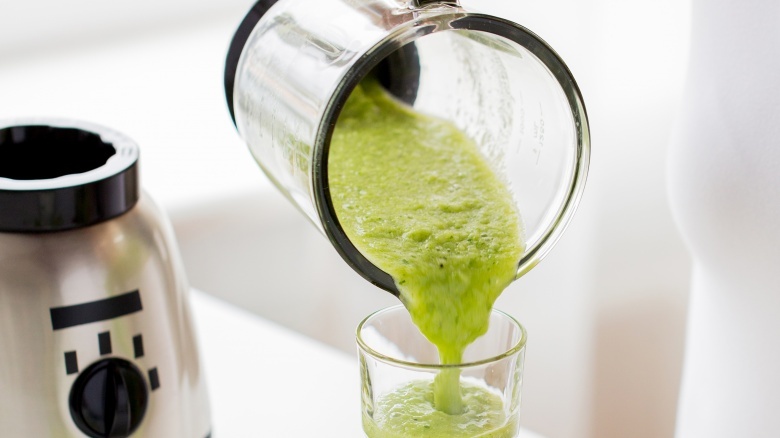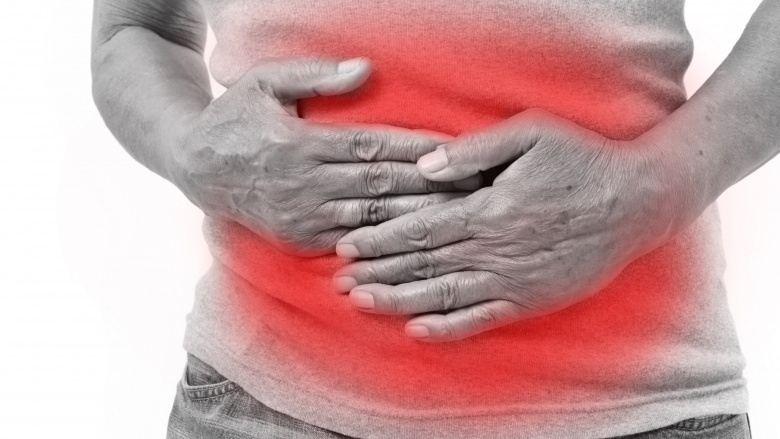What Really Happens To Your Body When You Get The Hiccups
It happens to us all. You're sitting there, minding your own business, when suddenly your body convulses uncontrollably and you belch out that most disturbing and annoying sound: "HICCUP!" Whether we think they're silly, annoying, or just a plain nuisance, there seems to be no relief from the onslaught of an unwelcome "HIC" every now and again. But what do we know about these annoying sounds? Why do they happen? What's the best way to stop them? Can they hurt you? Let's find out ...
Your muscles spasm uncontrollably
Believe it or not, hiccupping is all about your muscles ... no, not your biceps, stop flexing. It's actually the diaphragm muscles causing you to experience singulata. (That's the hoity-toity term for hiccups, and we won't be using it again, but if you ever want to be "that guy" at a party, it's all yours.)
This can happen a number of different ways, but most often, you get the hiccups when you are drinking or eating too much or too quickly. This can cause your stomach to distend, which irritates the diaphragm, causing it to basically freak out. The diaphragm and intercostal muscles (found between the ribs) become irritated and contract. This normally happens whenever you take a breath, and it's automatic for regular breathing, but when it happens via stomach distension, it causes you to take in a breath very quickly and unwillingly—your body doesn't like it when that happens.
You gulp in some air you weren't planning on
Now that your diaphragm and intercostal muscles are doing their own thing, your lungs force you to take in an extra gulp of air. When you do this, and your brain doesn't first give the go-ahead, problems arise.
The issue can be found in your larynx (voice box) and glottis (the opening of the larynx). These muscles want absolutely nothing to do with this unwelcome intruder air, so they decide to contract at exactly the same time. The contraction closes off air intake and, even though your body is saying "I need a huge gulp of air," it is simultaneously not allowing your body to take it. That means you're trying to breathe in a lot of air, but are unable to. That's why your body tends to lurch and jump a bit when you hiccup.
You make that all-too-familiar sound when the glottis slams shut, and your lungs don't get the air they were promised by your diaphragm. When it happens, you know you won't get off with just one. More are coming! But how many do we normally get, and when does it go from being annoying, to something far more serious?
How many hiccups is too many, and how bad can they get?
Most people hiccup between 6-7 times, but that's just more of an annoyance than anything else. If they last any longer, you'll probably knock out an average of 63 hiccups. Any longer than that, well, say hello to the Guinness Record book, and maybe a hospital bed.
Case in point: Charles Osborne, who unwillingly holds the record for the longest bout of hiccups known to man. He began hiccuping in 1922 and didn't stop until February 1990. That's not a typo — he had continuous hiccups for 68 years, for a total of about 430 million hiccups over his lifetime, one of the few world records nobody ever wants to break. When it first began, Osborne would hiccup around 40 times a minute, though it slowed to about half that as he got older. (Note: 20 hiccups a minute isn't fun, either.) Eventually, he had to grind his food in a blender, due to the difficulty he had in moving solid food down to his stomach.
This probably won't happen to you if you hiccup a few dozen times and then find yourself miraculously cured, but it is something to keep in mind. Just in case.
They could be attached to far more serious ailments
Eating or drinking too quickly isn't the only way for people to get the hiccups. Sometimes you can get them from spicy foods, being surprised, and even stress. There are also some serious diseases that can cause hiccups. Since hiccups are directly connected to your central nervous system, tumors of all things can affect the diaphragm, causing hiccups. In addition, hiccups can come via encephalitis, meningitis, AIDS, gastrointestinal problems like an obstruction or inflammation, and even alcoholism, as many a cartoon drunk has demonstrated over the years.
If you find yourself hiccupping uncontrollably for longer than anyone around you can stand, you might want to see a doctor, instead of live streaming it online. Get a professional's opinion, because you could have a more serious problem than interrupting everything you say and do with a hiccup every few seconds. All the viral views in the world aren't worth that.
Is this damaging my body in any way?
Even if there's no underlying disease or other symptoms causing your hiccups, they can cause some serious health concerns if they go on for a long time. Most people who suffer from extended hiccups experience exhaustion caused from difficulty sleeping (more on that in a moment), malnutrition and weight loss due to difficulty eating, as well as dehydration. A lot of people also experience chest pain during one or more hiccups and, in some cases, people can vomit as a result of an especially nasty one.
While these symptoms on their own don't generally lead to severe health problems when treated, a person suffering from prolonged hiccups can develop further problems such as a heart arrhythmia, esophageal reflux, and other gastrointestinal disorders, which can lead to death. Don't freak out if you started hiccupping like crazy after reading that, you should be fine. You might be a hypochondriac, though, and you may want to get that checked out.
Oh, and about sleep: a study in 1996 found chronic hiccups make it hard to fall asleep (for obvious reasons) so sufferers have poor sleeping habits. However, when someone with them finally falls asleep and enters REM (Rapid Eye Movement) sleep, their hiccups stop! Scientists found that while hiccups do disrupt sleep, they don't interrupt established sleep. For some reason, the brain realizes the hiccups aren't needed any longer, and puts an end to them. Unfortunately, a chronic sufferer would never know this, which can make it seem like they're getting less sleep than they actually are.
What is making this happen in the first place?
No doubt you have given yourself a short burst of hiccups from scarfing down bread too quickly, or even from the occasional drink, but what is causing people to have severe hiccups, and who suffers from them the most? If you are a guy, go ahead and pat yourself on the back, because you are five times more likely to suffer from severe hiccups than your female friends! Medical science doesn't know why this is, but a Y chromosome isn't the only risk factor for the unending horror that is the hiccup. People who have recently had abdominal surgery, been given general anesthesia, have severe esophageal acid reflux disease, or had a bronchoscopy or other procedure involving your eating and breathing tubes, can experience an onslaught of hiccups.
When a person suffers from hiccups of this nature, they are treated most often with drugs like lidocaine. Doctors prefer to treat hiccups orally, but when that becomes impossible due to the hiccups themselves, they go straight for the veins. This doesn't always work, and problems can persist without doctors knowing why, or how to stop them.
Honestly, sometimes the best remedies are the old ones ...
What really works to stop them?
Everyone seems to have the answer to this question. Whether it's drinking from the other side of a glass, holding your breath, being scared, counting to 10, or just being distracted, it seems all of us "know" the cure. But do any of these cures actually work? As it turns out ... not really. Most of these are pure homeopathic nonsense, but there is a touch of science in one of these.
The one cure that most people put stock into is scaring someone, but why would this work anyways? As it happens, when you're scared, you often take in a deep breath involuntarily. This happens in a different way than a hiccup, because your vocal chords don't slam shut. As a result, you essentially jump-start your breathing pattern and give the old sympathetic nervous system a boost. This can reset your brain's priorities, bringing about an end to your ongoing frustration.
Some other remedies that bridge the gap between science and the placebo effect are holding your breath or breathing into a bag. Both of these actions cause an increase of carbon dioxide to build up in your lungs. When it's present in your lungs, carbon dioxide has the effect of forcing your brain to focus less attention on continuing the hiccups, and more on restoring your oxygen supply, which can legitimately stop the hiccups. Sometimes. They're pesky, unpredictable little things.
Is there any way to prevent them from starting in the first place?
The short answer is, unfortunately, no. We have a pretty good understanding of some of the causes of regular hiccups, but in a lot of cases of intractable hiccups (those that persist beyond the normal period of time), the cause is unknown. And if we don't know what's causing the problem, it becomes very difficult to stop it from happening.
For the stuff we can personally control, the answer is closer to yes. If you get the hiccups when you drink too much and just gulp it down, maybe ... try not doing that? Same goes for eating. If you like to consume food without chewing and instead just inhale as much as your throat will allow without choking to death, we suggest you try cutting up and chewing your food. Slow down and enjoy the delicious noms — something we should all do more, annoying hiccups or not.




